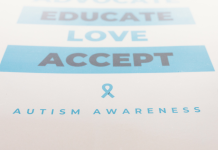 Knowledge is power! The more we know, the better we can help ourselves and understand others around us. It’s also such an essential part of how we grow as individuals. With endless topics to choose from, we can learn whatever we’d like. However, new topics can sometimes pick us.
Knowledge is power! The more we know, the better we can help ourselves and understand others around us. It’s also such an essential part of how we grow as individuals. With endless topics to choose from, we can learn whatever we’d like. However, new topics can sometimes pick us.
I knew very little about Autism before my son received his diagnosis. This meant I had A LOT to learn. One of the first things I noticed at the beginning of my journey was the vocabulary. Every few days I was learning new Autism terms or acronyms. It was getting hard to keep up with all of them plus everything else I was learning.
But things are different now. With some time, effort, and help (from some extremely intelligent women) I’ve gained and retained so much knowledge. However, I know I have a long road ahead. While my journey of educating myself on this topic may never be complete, I thought it might be nice to share some of what I have learned with all of you.
Below is a list of some of the Autism terms and acronyms I know and use on a semi-regular basis:
EI: Early Intervention helps children improve their abilities and learn new skills from birth to 3 years of age.
ABA: Applied Behavior Analysis is a therapy that helps kids with Autism learn skills and lessen problematic behaviors. There are several different forms of ABA therapy.
PICA: A condition in which a person eats things not usually considered food.
OT: Occupational Therapy is meant for clients with injuries, illnesses, or disabilities to help meet their goals to develop, recover, improve, and maintain skills needed for daily living.
ST: Speech Therapy can help people who have difficulty speaking to communicate better and to break down the barriers that result from speech impediments.
Stimming: or self-stimulatory behavior is repetitive body movements or noises.
Sensory Overload: When your five senses take in more information than the brain can process. When your brain becomes overwhelmed by this input, it enters fight, flight, or freeze mode as a response to what feels like a crisis, making you feel unsafe and panic.
Advocate: A person who represents another person’s interest.
Elopement: Running away or wandering off from a designated area without permission. This can include running away from a parent at a store or a parking lot, escaping from a home, or running away from school.
Transition Strategies: Techniques used to help support people with Autism during changes to their daily routines, activities, and settings.
IEP: An individualized education plan is a plan or program developed to ensure that a child who has a disability identified under the law and is attending school receives specialized instructions and related services.
Learning about topics we are unfamiliar with makes us smarter individuals and more understanding ones too. While we all may talk to one another daily, we don’t all speak the same language. Educating ourselves on topics like Autism helps us open our minds up to other people’s situations. It’s when we open our minds that we can in turn open our hearts.










